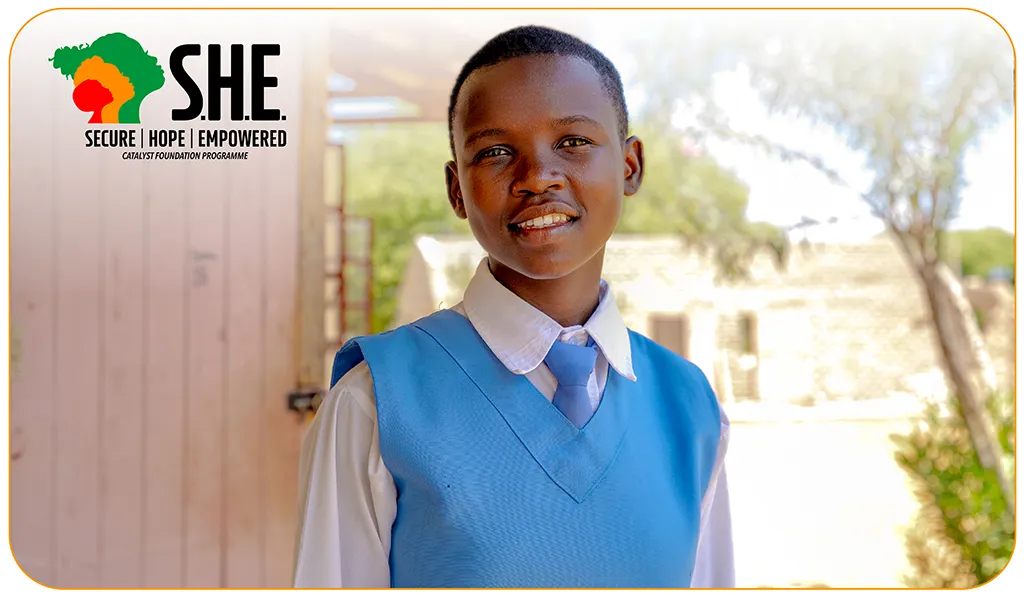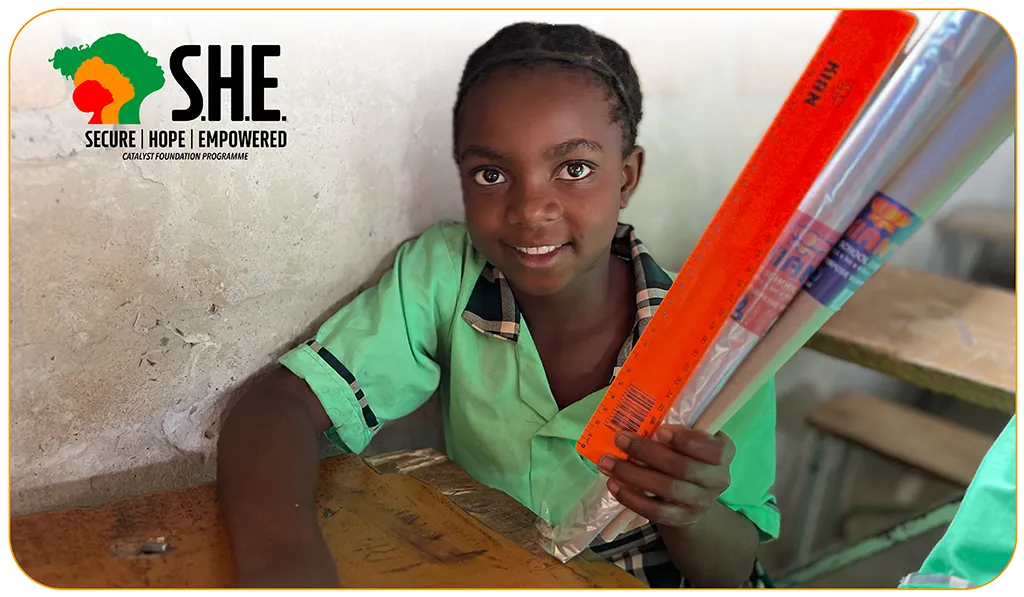Table of Contents
The Invisible Chains
Across the globe, childhood is a sacred period for growth, learning, and play. Yet, for millions of children, this fundamental right is tragically stolen by child labour. This insidious practice traps young lives in cycles of exploitation, denying them education, health, and a dignified future. At Catalyst Foundation, we witness this devastating reality in the communities we serve in Zimbabwe and Zambia, where poverty, lack of awareness, and entrenched stigmas can push vulnerable children into harmful work.
We believe that every child deserves to flourish, to attend school, and to pursue their dreams free from exploitation. This blog post will delve into the legal frameworks designed to protect children in Zimbabwe and Zambia, expose the stigmas that perpetuate child labour, and illuminate how Catalyst Foundation, through our transformative S.H.E. (Secure, Hope, Empowered) Programme, is actively working to break these barriers and foster a future where childhood is truly sacred.
Understanding Child Labour: More Than Just Work
It is vital to distinguish between children assisting with light chores appropriate for their age and genuine child labour. While age-appropriate tasks can teach responsibility, child labour is work that deprives children of their childhood, their potential, and their dignity, and that is harmful to their physical and mental development. It interferes with their schooling by obliging them to leave school prematurely, or by requiring them to combine school attendance with excessively long and heavy work. The International Labour Organization (ILO) estimates that millions of children worldwide are engaged in child labour, with a significant proportion in sub-Saharan Africa. The impacts are devastating: health problems, illiteracy, perpetuation of poverty, and a lost generation. This is a critical issue that demands our immediate attention in efforts to end child exploitation in Africa.
The Legal Shield: Child Labour Laws in Zimbabwe and Zambia
Both Zimbabwe and Zambia have taken important steps to legislate against child labour, reflecting their commitment to international human rights conventions. However, the existence of laws does not always guarantee their full enforcement or widespread public awareness.
Child Labour Laws in Zimbabwe: A Framework for Protection
Zimbabwe’s Constitution, in Section 81 (Children’s Rights), explicitly protects children from economic exploitation and from performing any work that is likely to be hazardous, interfere with their education, or be harmful to their health or physical, mental, spiritual, moral, or social development. The Labour Act (Chapter 28:01) further stipulates a minimum age for employment, generally prohibiting children under 15 years from working. It also regulates the types of work young persons (aged 15 to 18) can engage in, prohibiting hazardous or night work. The Education Act reinforces these protections by making primary education compulsory, aiming to keep children in schools and out of exploitative labour.
Despite these legal provisions, challenges persist. High poverty rates in rural areas often compel families to rely on children’s labour for survival, particularly in agriculture, mining, and the informal sector. Awareness of these laws is not always widespread, especially in remote communities, making enforcement difficult and leaving children vulnerable.
Child Labour Laws in Zambia: Safeguarding Futures
Zambia’s commitment to children’s rights is enshrined in its Constitution, particularly under Article 24, which protects young persons from economic exploitation and from performing work that is hazardous or detrimental to their health, education, or development. The Employment of Young Persons and Children Act sets out specific provisions regarding the minimum age for various types of employment and prohibits the engagement of children in hazardous occupations. Like Zimbabwe, Zambia’s Education Act supports these efforts by promoting compulsory schooling, aiming to keep children in educational settings.
Similar to its neighbour, Zambia faces hurdles in fully eradicating child labour. The informal sector, particularly in agriculture and small-scale mining, remains a significant challenge, often operating outside formal regulatory oversight. Poverty continues to be a primary driver, pushing families to seek any means of income, inadvertently exposing children to exploitation. Promoting children’s rights in Zambia requires a multi-faceted approach.

Breaking Down Stigmas: Our Holistic Approach
While legal frameworks are essential, effective change also requires addressing the underlying societal norms and stigmas that allow child labour to persist. Sometimes, parents in dire circumstances genuinely believe that a child contributing to household income is the only way to survive, unaware of the long-term detriments. Traditional views or a lack of awareness about the true value of education can also contribute.
At Catalyst Foundation, we recognise that breaking the cycle of child labour requires more than just legal intervention; it demands a holistic, community-centred approach that tackles the root causes and shifts perceptions. Our S.H.E. (Secure, Hope, Empowered) Programme is meticulously designed precisely for this purpose.
The S.H.E. Programme: Education, Empowerment, and Safe Havens
Our S.H.E. Programme stands as a powerful bulwark against child labour by prioritising the comprehensive well-being and girls’ education in Zimbabwe and Zambia. We understand that keeping a girl in school is one of the most effective ways to protect her from exploitation and provide avenues for holistic development.
- Combating Period Poverty: A significant reason girls miss school, making them vulnerable to early labour or marriage, is the lack of access to sanitary products. Our programme provides essential menstrual hygiene support, ensuring girls can attend school consistently and with dignity. By normalising menstruation and providing resources, we remove a critical barrier to education, keeping girls in classrooms and away from premature work.
- Access to Education Essentials: We provide uniforms, stationery, and school fees where needed, ensuring that economic hardship does not become a reason for a child to drop out of school and enter the labour force. This direct support removes immediate financial pressures that might force a child into work.
- Safe Spaces and Structured Engagement: Beyond the classroom, our S.H.E. Programme works to create safe, structured environments for children, particularly after school hours. These engagements, which can include academic enrichment activities, life skills training, or organised recreational pursuits, provide crucial oversight and keep children from being vulnerable to engaging in casual, often exploitative, labour. These protective spaces are vital for their holistic development, offering alternatives to working prematurely.
- Building Resilience and Discipline: Through various program activities, we actively instil crucial life skills such as teamwork, discipline, leadership, and perseverance. These qualities not only support academic success but also provide children with the confidence and tools to avoid exploitative situations and pursue a healthier, more positive path.
- Mentorship and Role Models: Our dedicated S.H.E. team and volunteers serve as positive role models. They guide children towards a future rooted in education and healthy development, rather than exploitation. Their presence and guidance help children understand their rights and potential, fostering self-worth and resilience.
- Empowerment Through Awareness: Through interactive workshops and community dialogues, we educate girls, their parents, and community leaders about children’s rights and the detrimental long-term effects of child labour. Empowered girls understand their value and rights, making them less susceptible to exploitation. This fosters a broader understanding of youth empowerment in Africa.
By fostering health, education, and safe spaces, Catalyst Foundation is not only directly preventing child labour but also changing societal perceptions. We work to ensure that childhood is valued and protected for every child, directly addressing the intersection of poverty solutions in Zimbabwe and Zambia social development.
The Path Forward: A Collective Responsibility
Ending child labour is not merely a legal or economic challenge; it is a moral imperative that demands collective responsibility. Governments must strengthen enforcement mechanisms and expand social protection programmes. Businesses must ensure ethical supply chains, free from exploitation. Communities must champion children’s rights and education. And individuals must become advocates, allies, and supporters.
Our work is crucial in bridging the gap between legislation and lived reality. We are on the ground, delivering tangible solutions and fostering a generation that is Secure, Hopeful, and Empowered. We believe that by investing in a child’s right to an education and a safe environment, we are directly dismantling the structures that perpetuate child labour.
Call to Action: Be a Catalyst for Change
The fight against child labour is ongoing, but with your support, we can safeguard more futures and empower more children.
- Donate: Your financial contribution directly enables our S.H.E. Programme to provide education, health support, and safe spaces, actively preventing child labour. Visit www.catalystfn.org/donate to make a difference.
- Partner: Explore corporate social responsibility (CSR) opportunities with us. Collaborate with us to strengthen our programmes and expand our reach in Zimbabwe and Zambia. Contact us at info@catalystfn.org for partnership inquiries.
- Volunteer: Lend your time and skills to support our initiatives. Your dedication on the ground or remotely can make a profound impact, contributing directly to our efforts to protect children. Learn more at www.catalystfn.org/volunteer.
- Advocate: Share this blog post. Raise awareness in your networks. Speak out against child labour and champion children’s rights, particularly in vulnerable communities.
Join us in ensuring that childhood is a time of joy and learning, not labour and exploitation. Together, we can build a future where every child in Zimbabwe and Zambia is free to dream.



